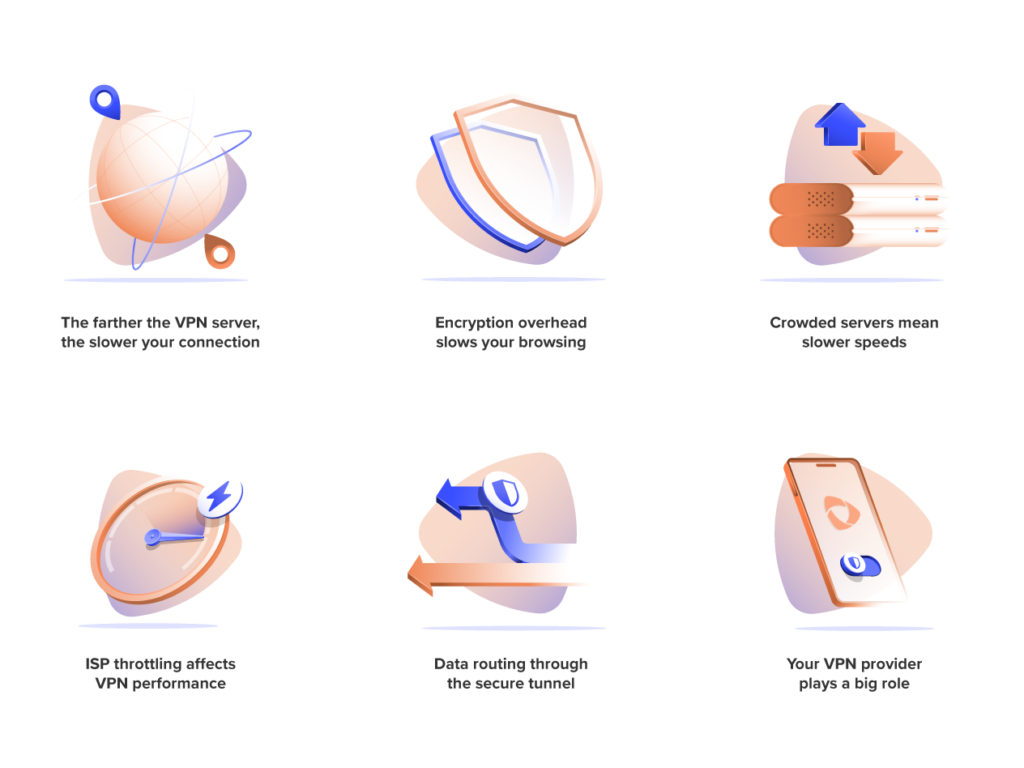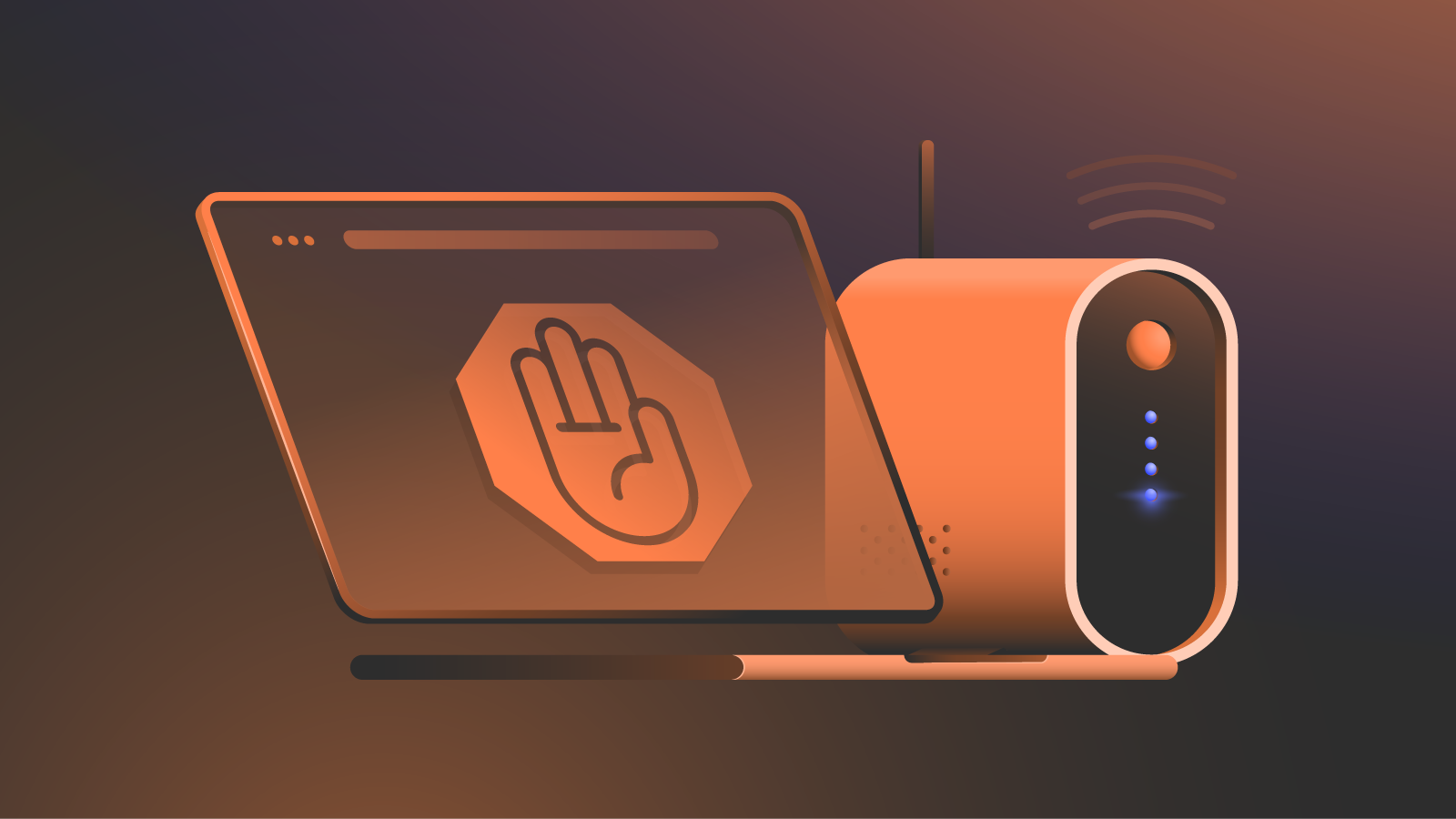
A virtual private network, or VPN, can shave a few Mbps off your speed because traffic is encrypted and detours through a secure server, but choosing WireGuard and a nearby, low-load node keeps browsing, streaming and gaming feeling just as fast.
If you’ve ever connected to a VPN and noticed slower page loads, buffering videos, or laggy online games, you’re not alone. It’s frustrating when your efforts to stay private online seem to come at the cost of performance. So what’s really going on behind the slowdown?
In short, yes, a VPN can slow your internet speed. That’s because your data has to travel a longer, more secure route, adding a few extra steps that can impact performance.
But don’t worry, the slowdown isn’t always noticeable, and there are plenty of ways to minimize the impact. In this article, we’ll explain exactly why VPNs slow down the internet and share practical tips to keep your connection running smoothly while maintaining your online privacy.
Why does a VPN slow down my internet?
To fix or avoid VPN speed issues, it helps to understand what’s causing them. Let’s break down the most common reasons a VPN might slow your connection, and what you can do about each one.
Understanding why your VPN affects your speed helps you make better decisions about when and how to use it. Here are the main reasons your Wi-Fi connection might be causing slowdowns:

Does server distance slow down a VPN connection?
Your device sends data to the VPN server before it goes to the final destination, and if that server is far away, your traffic takes a longer trip. That physical distance translates into delay.
For example, if you’re in Miami and connect to a server in Los Angeles, your data travels across the country and back. This physical distance adds about 70-100 milliseconds of ping time compared to your regular connection. That might not sound like much, but it can make the difference between smooth and jerky video calls.
When you choose a server that’s thousands of miles away, you’re essentially forcing your data to take a road trip across the country before reaching its destination.
How does encryption overhead affect browsing speed?
VPNs protect your data by encrypting it, but that extra layer of security also takes extra processing time. Especially on older devices, this can slightly drag down performance.
Most VPNs use AES-256-bit encryption (bank-grade protection), which is extremely secure but demands more processing power than lighter security methods. Your device has to work harder, especially if you’re using an older computer or smartphone with limited CPU capabilities.
The extra milliseconds per data packet can slow down your bandwidth limits.
Can crowded VPN servers reduce my speed?
If too many people are connected to the same VPN server, everyone’s connection can suffer. This is common with free or low-cost VPNs that don’t have the resources to manage demand.
During peak usage times (typically evenings), server capacity gets stretched thin. This is why you might notice your VPN speed drops significantly around 8 pm when everyone starts streaming movies.
Budget VPN services often set up fewer servers with limited bandwidth to save money, leading to more congestion. Before connecting, check server load metrics; many quality VPNs display this information so you can avoid overcrowded options.
VPN server recap
1. Distance + encryption = main speed killers
2. WireGuard + nearby server fixes 80% of lag
3. Cheap/free VPNs slow you down the most
Will my ISP throttle VPN traffic and slow me down?
Some internet service providers (ISPs) throttle, or intentionally limit, certain types of traffic, like streaming or large downloads. VPNs can help bypass this, but they can also be a target themselves.
When your ISP spots encrypted VPN data, it might become suspicious and slow it down. However, the opposite can also happen, if your ISP normally throttles streaming services, a VPN can actually make these services faster by hiding what you’re doing online.
This technical cat-and-mouse game between ISPs and VPN services affects your overall speed. Some VPNs are better at disguising their traffic patterns to avoid triggering throttling algorithms.
How do extra “hops” in a VPN route increase latency?
Instead of going straight to a website, your data takes a more indirect route through the VPN server. These extra “hops” can slow things down if the route isn’t optimized.
These extra “hops” in the network path increase latency. Each additional connection point represents another potential bottleneck where delays can occur.
Many router configuration mistakes can also hamper your VPN speed. Outdated firmware, incompatible security settings, or even the wrong DNS servers can all contribute to slower connections.
Does my choice of VPN provider influence speed?
A well-built VPN infrastructure can handle speed and security with ease. But cheaper or poorly managed VPNs can bottleneck your connection, especially during peak hours.
Server-to-user ratios vary wildly across providers. Overcrowded servers with too many users sharing limited resources will naturally run slower than well-maintained networks with proper capacity planning.
When choosing a cybersecurity solution like a VPN, remember that more protection features often correlate with more slowdown. Services that offer double encryption, deeper packet inspection, or additional security layers will typically run slower than more streamlined options.
How can I speed up a slow VPN?
Now that you know what slows down a VPN, let’s talk about what you can do. Here are practical ways to speed things up, without sacrificing your privacy:
Which VPN features give the fastest internet speeds?
Your choice of VPN provider affects performance more than any other factor. Look for services with:
- Large server networks (1000+ servers) for better distribution of users
- WireGuard encryption protocol (the newest, fastest VPN technology)
- Server locations near your physical location
- Good reputation for speed and reliability
FastVPN offers all these features with over 1,000 servers in more than 75 locations across 50+ countries.
The WireGuard protocol deserves attention; it’s a game-changing technology that offers significantly faster speeds than older protocols like OpenVPN, while maintaining strong security. FastVPN and other quality providers now support this advanced option.
Will connecting to a nearby server improve VPN performance?
Connecting to a server in your city can improve performance by reducing latency and minimizing traffic hops.
Run a quick ping test to identify optimal connections. Most VPNs have this feature built in, or you can use online tools. Lower ping numbers (measured in milliseconds) indicate better potential performance.
City-level selection outperforms country-level every time. Connecting to a server in your own city can be up to 10 times faster than one across the country. FastVPN’s user interface makes finding nearby servers simple with clear location indicators and distance information.
Do free VPNs cause buffering and slow speeds?
Free VPNs seem appealing, but they typically create the worst performance issues. With free services, you pay with speed instead of money.
These providers typically maintain fewer servers shared by millions of users, creating massive overcrowding. Statistical analysis shows free VPNs can reduce your connection speed by about two-thirds slower compared to premium options.
Beyond performance issues, free VPNs often compromise on security and may even sell your browsing data to advertisers, defeating the primary purpose of using a VPN.
FastVPN offers affordable plans that significantly outperform free VPNs
Which VPN protocol is fastest for everyday use?
Different VPN protocols balance security and speed in various ways:
- WireGuard: The newest and fastest protocol, offering excellent security with minimal overhead
- IKEv2: Fast reconnection times, great for mobile devices that switch between networks
- OpenVPN: The most compatible option, but slower than newer alternatives
When absolute security isn’t critical (like casual browsing or streaming), choose WireGuard for the best performance. Save OpenVPN for banking, sensitive work, or when connecting from countries with strong internet censorship.
Your device also affects protocol performance. Newer smartphones and computers handle encryption better, allowing you to use more secure protocols without significant slowdown.
How do I avoid overloaded VPN servers?
Many quality VPNs display server load percentages that predict performance before you connect. Lower percentages mean fewer users currently on that server and typically better speeds.
Time-of-day strategies can help avoid digital congestion periods. Servers in business districts tend to be busier during work hours, while residential area servers get crowded in the evenings.
FastVPN’s dashboard highlights the least congested options, making it easy to find servers with capacity to spare. Sometimes choosing a server with slightly higher ping but lower user load results in better overall performance.
Can firewall settings boost my VPN speed?
Firewalls can silently hinder VPN performance if not properly configured. By default, some security software treats VPN connections as suspicious and throttles their traffic.
Follow these steps to optimize your firewall:
- Add your VPN application to your firewall’s whitelist
- Allow UDP ports commonly used by VPN protocols (typically 1194, 443, and 51820)
- Consider temporarily disabling your firewall when troubleshooting severe speed issues
Sometimes you’ll need to restart your router after making these changes for them to take effect. However, don’t restart unnecessarily; it won’t help if the issue lies elsewhere.
Which VPN features can I disable for extra speed?
Modern VPNs include additional security features that, while valuable, can reduce performance. When speed is crucial, consider temporarily disabling:
- Split tunneling lets you choose which apps use the VPN and which don’t. By routing only privacy-sensitive traffic through the VPN, you can significantly boost overall performance.
- Some VPNs offer double VPN/multi-hop features that route your traffic through multiple servers for extra security, but can cut your speed in half. If your VPN has this feature and you don’t need the extra security, disable it for better performance.
- Deep packet inspection adds security but requires significant processing power.
Create different configuration profiles for different needs. For example, use maximum security settings for banking but switch to a speed-optimized profile for streaming or gaming.
Can a VPN bypass ISP throttling and increase speed?
If your ISP throttles specific services like Netflix or YouTube, a VPN might actually improve your speed by preventing this targeted slowdown.
Conduct a simple test to determine if your ISP is throttling your connection:
- Measure your download speed without a VPN
- Connect to your VPN and measure again
- If speeds improve for specific services, your ISP was likely throttling them
Try different protocols if you suspect your ISP targets VPN traffic specifically. Some providers can detect and throttle OpenVPN connections but may not recognize WireGuard traffic patterns.
Will my VPN’s ad blocker make pages load faster?
Many VPNs now include ad-blocking functionality that can significantly boost browsing speed while you browse anonymously.
By blocking these elements before they load, you experience faster page loading times and reduce overall data usage. This feature functions as both a security enhancement and a speed improvement tool.
FastVPN includes an ad blocker that filters out intrusive ads and malicious trackers, improving both performance and protection with one simple setting.
Can a VPN ever speed up my internet?
While VPNs typically slow connections, there are specific situations where they actually improve speed:
When can a VPN beat ISP throttling?
If your internet service provider deliberately slows down streaming platforms, file downloads, or gaming services, a VPN can bypass these restrictions by masking what you’re doing online.
Users have reported Netflix streaming quality jumping from SD to 4K after enabling a VPN, despite the overhead of encryption. This happens because their ISP can no longer identify and throttle the streaming traffic.
Can a VPN fix poor ISP routing?
Sometimes your internet service provider doesn’t take the most efficient path to certain websites or services. This is particularly common with international connections.
A VPN can potentially provide better routing to specific destinations. Users connecting to international gaming servers often find lower ping times when using a VPN server located near the game server, despite the additional encryption overhead.
Does a VPN speed up public Wi-Fi connections?
Public Wi-Fi networks often restrict bandwidth and limit connection speeds. Some VPN services use compression technologies that can partially overcome these limitations, resulting in better performance than a direct connection.
To determine if a VPN might improve your specific situation:
- Run speed tests with and without your VPN enabled
- Test multiple server locations at different times of day
- Compare different activities (browsing, streaming, downloading)
- Document your findings to identify patterns
While not everyone experiences speed improvements, those dealing with aggressive ISP throttling often find that a paid VPN service actually makes their internet faster in specific scenarios.
How do I balance VPN speed and security?
VPNs typically slow down the internet, but the tradeoff brings substantial benefits in privacy and security. The good news is that with the right configuration and provider, the slowdown can be minimal or even unnoticeable for most activities.
The performance difference between good and bad VPN choices exceeds what most users realize. Investing in a quality service like FastVPN with modern protocols, extensive server coverage, and optimization features pays dividends in both speed and security.
For everyday browsing and streaming, follow these three simple steps:
- Connect to a nearby server using the WireGuard protocol
- Enable the ad blocker for faster page loading
- Use split tunneling for applications that don’t need privacy protection
For Mac users looking for a balance of speed and security, FastVPN for Mac provides an optimized experience with easy protocol switching. Windows users can get started with FastVPN for Windows, which includes built-in optimization features for the operating system.
Fast, secure internet is essential for remote workers, gamers, and privacy-conscious users. With the right VPN, you don’t have to sacrifice performance for protection.
Find the balance that works for your needs, and remember that not all VPNs are created equal. Choose one that’s designed for speed as well as security.
Final recap
• Distance + encryption are the two main speed killers
• Fix 80% of lag by using WireGuard on a nearby, low-load server
• Premium VPNs with large networks beat free services for both speed and privacy
Frequently asked questions
How much does a VPN slow down the internet?
A VPN typically reduces internet speed by a noticeable amount, depending on several factors. The slowdown varies based on your distance from the server, encryption level, VPN protocol used, and your provider’s quality. Paid VPNs using the WireGuard protocol cause minimal slowdown, while free VPNs generally have a more significant impact on performance.
Does a VPN increase ping?
Yes, a VPN increases ping (latency) because your data travels a longer route through the VPN server before reaching its destination. This extra distance adds milliseconds to your ping depending on server location. Connecting to nearby servers minimizes this effect. For gaming or video calls, choosing servers with the lowest ping values is crucial.
Does a VPN help with buffering?
A VPN can help with buffering if your Internet Service Provider is throttling streaming services. By masking your streaming activity, VPNs prevent targeted throttling that causes buffering. However, if buffering occurs due to general slow internet, a VPN might worsen the problem. Enable the ad blocker feature and connect to a nearby server for best streaming performance.
Does a VPN slow down the internet on an iPhone?
VPNs do slow down the internet on iPhones, but modern iPhones handle encryption efficiently, minimizing the impact. For best performance on iPhone, choose nearby servers, use IKEv2 or WireGuard protocols, and avoid free VPN apps that tend to significantly reduce speed. The latest iPhone models generally handle VPN overhead better than older devices.
Does a VPN slow down your Wi-Fi connection?
A VPN doesn’t slow down Wi-Fi itself, but it does slow your internet connection when using Wi-Fi. The VPN’s encryption and routing processes affect your overall connection speed regardless of whether you’re using Wi-Fi or cellular data. The impact on Wi-Fi connections can be reduced by choosing nearby servers and optimizing your router configuration.
How much slower is the internet when using a VPN?
Using a VPN makes your internet noticeably slower, with the exact impact varying widely based on multiple factors. Paid VPNs with WireGuard protocol tend to have minimal impact, while free services typically cause more significant slowdowns. The effect depends on your original connection speed, device processing power, server distance, and the time of day you’re connecting.







